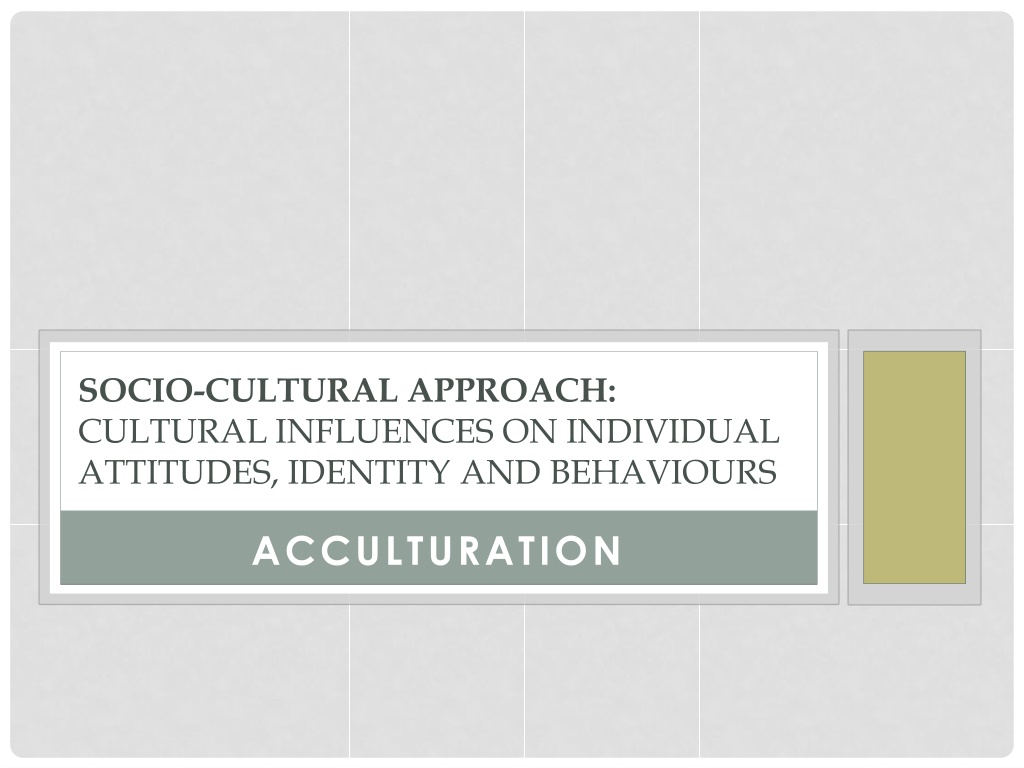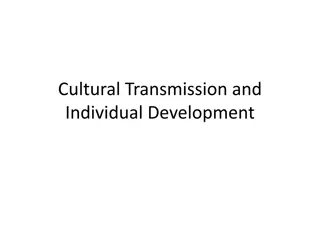Understanding Acculturation: Cultural Influences and Identity Changes
Acculturation is the meeting of cultures leading to changes in individual attitudes, behaviors, and identity. It involves the adoption of elements from a foreign culture and impacts various aspects such as customs, language, and socialization. This process can result in both adaptation and resistance to the host culture's norms. Explore related concepts like multiculturalism and the psychological effects of acculturation on individuals.
Download Presentation

Please find below an Image/Link to download the presentation.
The content on the website is provided AS IS for your information and personal use only. It may not be sold, licensed, or shared on other websites without obtaining consent from the author. Download presentation by click this link. If you encounter any issues during the download, it is possible that the publisher has removed the file from their server.
E N D
Presentation Transcript
SOCIO-CULTURAL APPROACH: CULTURAL INFLUENCES ON INDIVIDUAL ATTITUDES, IDENTITY AND BEHAVIOURS ACCULTURATION
ACCULTURATION the meeting of cultures and the resulting changes A process of social, psychological, and cultural change stemming from blending of cultures effects can be seen at different levels, e.g. societal and individual in the original (native) and newly adopted (host) cultures. As enculturation is used to describe the process of first-culture learning, acculturation can be thought of as second-culture learning.
FORMAL DEFINITIONS Those phenomena that result when groups of individuals having different cultures come into continuous first-hand contact with subsequent changes in the original culture patterns of either or both groups (Redfield et al. 1936) The progressive adoption of elements of a foreign culture (ideas, words, values, norms, behaviours, institutions) by persons, groups or classes of a given culture. (International Organisation for Migration 2004)
PROBLEMS WITH THESE DEFINITIONS IOM misses the idea that people might reject or resist certain aspects of the host culture and this is as interesting as adoption of elements.
SIMILAR CONCEPTS Bi-culturalism Multiculturalism Neoculturation Integration Resocialisation Ethnic identity Globalisation Westernisation Coca- colanization
PRIMARY INTERESTS IN ACCULTURATION PSYCHOLOGY What happens when people take the behavioural repertoire they have learnt in their native culture to a different cultural context? What are the possibilities? They don t change and become maladapted They change and become adapted Some behaviours change and some don t!
WHAT IS AFFECTED BY ACCULTURATION? Group level: customs, religious practices, diet, healthcare, education, food, clothing, language Individual level: affects the socialisation process by which non-native individuals adopt the values, customs, norms, attitudes, and behaviours of the dominant host culture May include changes in daily behaviour, plus numerous changes in psychological and physical well-being.
WHY DO PEOPLE END UP BEING EXPOSED TO SECOND/MULTIPLE OTHER CULTURE(S) Immigration; seeking a better life financial reasons fleeing from a natural disaster Seeking asylum from persecution or war Sojourners (temporarily living in a certain place) To trade, conquer or colonise another country For an adventure or fun! Indigenous people
PLURAL SOCIETIES A society in which a number of cultural groups reside together within a shared social and political framework (Skelton and Allen 1999) Maybe organised as
VARIETIES OF GROUPS IN PLURAL SOCIETIES
FACTORS AFFECTING ACCULTURATION Is the contact with the new culture Voluntary (immigrants) or involuntary (e.g. refugees) Sedentary (indigenous people) or migrant (refugees, immigrants) Temporary (e.g. sojourners) or permanent (indigenous people)
THREE TYPES OF ACCULTURATION (BORGARDUS 1949) Blind acculturation: two cultures affect each other on a chance basis Imposed acculturation: forced imposition of one culture upon another as in colonisation Democratic acculturation: members of each culture view the other with respect
HISTORY OF ACCULTURATION RESEARCH Philosophy: Plato talked about the human tendencies to travel and to imitate strangers; acculturation not seen as a good thing - laws were put in place to preserve Greek culture Ethnography: John Wesley Powell coined the term and in 1883 defined "acculturation" as the psychological changes induced by cross- cultural imitation. Anthropology interest in affect of colonisation of indigenous peoples Sociology - studies of immigration
PSYCHOLOGY AND ACCULTURATION Only in last few decades (1980s+) Vast increase in worldwide migration improved travel disasters (natural and manmade, including political, ethnic and religious violence) urbanisation; people moving from rural areas into cities Cross-cultural psychology has forced psychology as a whole to acknowledge the importance of culture as a critical determinant of human behaviour
STATISTICS Find out (this could be globally or in the UK) how many people are living in a culture other than the one they were born in? how many second generation immigrant children are there? how many people are studying in a host country?
THE BUILDING BLOCKS OF ACCULTURATION 1. Contact; continuous and first-hand living alongside people, internet communication, mass media 2. Reciprocal influence; groups differ in terms of power, e.g. economic/military/sheer number and this affects how much influence one group has on the other Often there will be a dominant group which is more influential Changes in the dominant culture are just as important to study Dominance is an important factor affecting rate and direction of acculturation
BUILDING BLOCKS OF ACCULTURATION 3. Change: psychologists may study the process by which change comes about and the outcomes , i.e. what the actual changes are. Cross-cultural studies useful to study outcomes, longitudinal studies necessary to study process not always possible to infer that a change is due to acculturation as it may well be an ontogenetic developmental change (e.g. as a consequence of interaction with the environment in general not the new culture as such) Changes may be affective, behavioural or cognitive (Ward 2001) Short term; behavioural shifts and acculturative stress Long term; adaptation which can be psychological (to do with wellbeing and satisfaction) and socio-cultural (culturally appropriate skills to fit in with the cultural milieu
ACCULTURATIVE POSSIBILITIES Bi-dimensionality term used to recognise the two dimensional nature of change, e.g. maintenance/loss of old culture adoption/rejection of new culture 4 possibilities To adopt the new culture and lose the old (assimilation) To adopt the new but also maintain the old (integration) To reject the new and maintain the old (separation) To reject the new and lose sight of the old (marginalisation)
THE PROCESS OF ACCULTURATION Originally it was conceived of as linear and stage-wise (Gordon 1964 seven stages) More recently it has been accepted that the acculturation may be segmented (Portes and Rumbaut 2001) Acculturation process is affected by.. Social class differences between native and host Time of arrival Context of reception It is now recognised people may be at different stages and using different acculturation strategies with regard to different social aspects of their lives (i.e. in terms of different sub-cultures within the host culture) Also, publically and privately people may reveal different behavioural, affective and cognitive changes
PROBLEMS IN ACCULTURATION RESEARCH Operationalising culture in the first place! Assumptions that cultural differences exist between the groups Assumption that representatives of the cultures will embody national values, etc. associated with cultural dimensions for the home country for example. It is essential to understand the cultural context in which acculturation is occurring as the context of reception for example is a critical factor affecting the process and outcomes There is little research on acculturation in cyberspace or via mass media, although the psychology of remote acculturation is taking off, e.g. Ferguson and Bornstein 2012 Snauwaert et al. (2003) when culture and related concepts are operationalised in different ways , different distributions of acculturation strategies were found
FACTORS AFFECTING THE ACCULTURATION PROCESS, (BERRY 2004)
CULTURAL DISTANCE When the two cultures are increasingly different to (distant from) each other, acculturation is likely to be more difficult and more likely to result in acculturative stress and difficulties in adapting long term. Physical difference, e.g. skin colour can also affect acculturation strategies, e.g. people of a different appearance to the dominant group may be less likely to opt for assimilation due to fear of rejection/discrimination
FACTORS AFFECTING INDIVIDUAL ACCULTURATION Strategies adopted by the larger (dominant) society will affect the individuals from non-dominant society, for example if the society attempts to enforce assimilation or embraces and encourages multi-culturalism, e.g.























